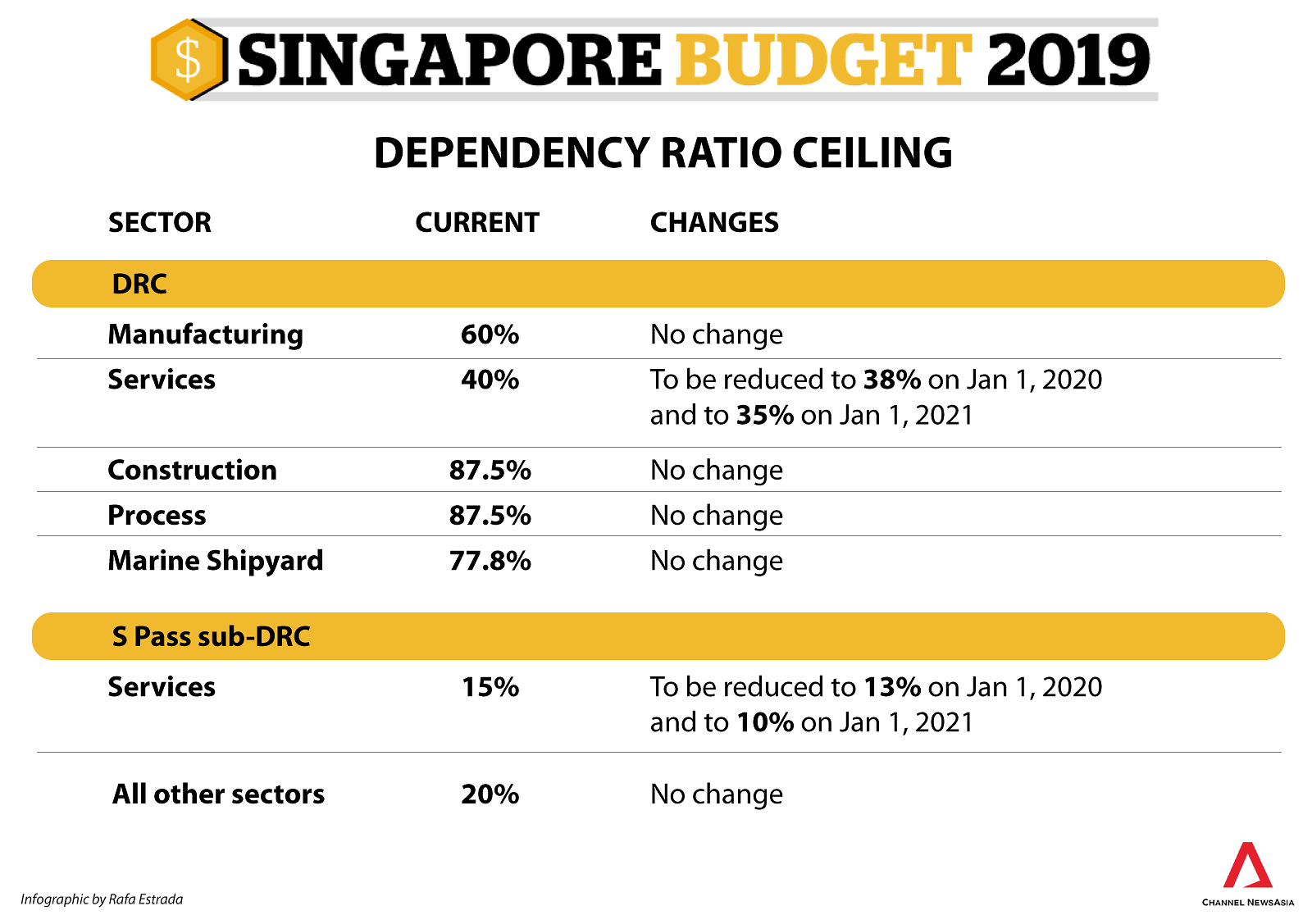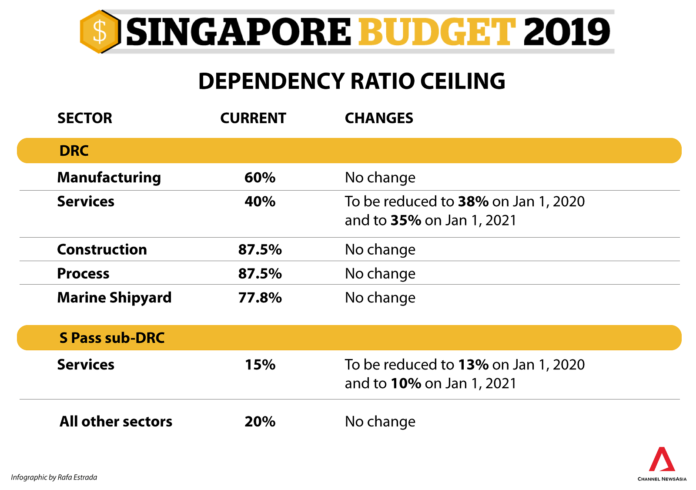SINGAPORE: Singapore’s services sector must bite the bullet and prepare for a day when there may be a dearth of foreign workers willing to work here for the sort of pay being offered for their jobs.
Minister for Manpower Josephine Teo says this is one of the main reasons why Singapore needs to reduce its dependency on foreign workers in this sector.
“It wasn’t an easy decision to make. We had to mull over the decision many times,” she said referring to Finance Minister Heng Swee Keat’s Budget 2019 announcement on cutting the foreign worker quota for the services sector.
READ: ‘We agonised over this’: Chee Hong Tat explains tightening of foreign worker quota for services sector
READ: Budget 2019: Services sector to face ‘challenge’ of tighter foreign worker quota, but adapting firms will benefit
Also known as the Dependency Ratio Ceiling (DRC), the quota tables the maximum permitted ratio of foreign workers to the total workforce that a company can employ.
The DRC for that sector will be further cut – in two stages – from the current 40 per cent to 35 per cent by 2021.
The S Pass sub-DRC will be lowered from 15 per cent to 10 per cent eventually in 2021.

Reduction in Dependancy Ratio Ceiling (DRC).
To further account for these decisions, Minister Teo, who was speaking to 938NOW in a recent interview, pointed to a future scenario of a growing middle class in South-east Asian countries.
If increasing affluence in these countries leads to their citizens start getting a level of pay comparable to what is being offered in Singapore, it may result in many of them declining such services jobs here.
She said: “We have to ask ourselves this question: ‘Do we think that it will always be a case where we can get an indefinite supply of foreign workers?’
“And if the answer to that is ‘No’, then we’d better think twice about that and adjust our policies.”
She added that positive outcomes arising from adjusting the DRC cuts will eventually lead to more sustainable business practices, holistic job redesign and reskilling of local workers to adapt to an increasingly digital future.
But the Government will also be helping firms to achieve this and more, via expanded schemes and new initiatives. For example, Finance Minister Heng announced a slew of measures worth S$1 billion to help local companies transform.
NO CHANGES IN OTHER SECTORS
In a Facebook post following the Budget announcements, Mrs Teo assured companies there will be no change to DRC quotas in other sectors.
She added that the Manpower Ministry will not raise foreign worker levies. Nor will it make changes to the current policy for Employment Pass holders.
READ: 7 things you need to know about Budget 2019
READ: Government will help businesses transform, reduce reliance on foreign manpower: Indranee Rajah
When it comes to incentivising companies to hire workers, particularly older ones and those who have been made redundant or are on the brink of retrenchment, Mrs Teo said programmes from the Manpower Ministry’s ‘Adapt & Grow’ initiative, such as the Career Support Programme (CSP), have worked.
Indeed, such Workforce Singapore programmes have, to date, placed more than 76,000 jobseekers into new roles.
It is why Mrs Teo said she is “very happy” with Mr Heng’s announcement that the CSP will be extended for two more years until March 2021.
And contrary to what some people may think, the Minister says many of these workers did not have to suffer a pay cut upon accepting new job offers.
“More often than we dared to expect, these people moved on to better jobs, in terms of pay,” she revealed
“Now we don’t dare to say that that is a promise, but I can share with that many people have been able to do so.”
She added that it takes tenacity and a certain growth mindset to venture into taking up a new job role in a different job environment.
“It does require a certain amount of willingness to adapt to either a different job or a different industry, particularly those who have entered into sectors that are in a growth stage,” she said.
“And that is where the opportunity to grow in your career is still possible.”
Displaced jobseekers who seek help from Workforce Singapore need not worry about forking out money for training costs, said Mrs Teo. This is because these skills-training programmes are heavily subsidised by the Government and prospective employers.
In all, the 2019 Budget will set aside a further S$3.6 billion to help workers ride the wave of technological disruption.
BICENTENNIAL BONUS
Another key Budget announcement was the disbursement of the Bicentennial Bonus worth $1.1 billion for lower-income Singaporeans.
Minister Teo says this should not be considered a handout. Instead, they should be seen as a way of recognising and remunerating these employees for their hard work.
READ: Budget 2019: S$1.1 billion Bicentennial Bonus for Singaporeans
READ: Bicentennial Bonus: What you need to know
“The Workfare Bicentennial Bonus recognises that they have put in the effort and therefore, provides them with a top-up that says ‘Well done and keep going!” Mrs Teo said.
‘If you think about the older Singaporeans who are about to retire, the Bicentennial Bonus package provides a CPF top-up.
“And that essentially says, ‘We know you’re concerned about retirement adequacy and this is one way in which the government can help.’”
Around 1.4 million lower-income Singaporeans will receive Bicentennial payments of up to S$300 through a GST Voucher cash payout.
Lower-income workers – under the Workfare Income or WIS scheme – will also get a Workfare Bicentennial Bonus.
They will get an extra 10 per cent of their payment for work done in 2018, with a minimum reward of S$100 in cash.
This article was adapted from an interview with Manpower Minister Josephine Teo on 938NOW’s new weekly interview series, “Question Time”, which airs every Friday. To listen to the interview, go to facebook.com/938Now/ or download the MeRadio app.





